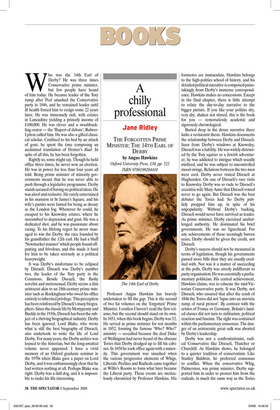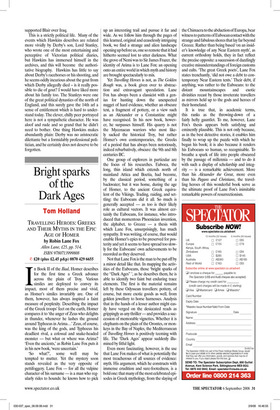A chilly professional
Jane Ridley
THE FORGOTTEN PRIME MINISTER: THE 14TH EARL OF DERBY by Angus Hawkins Oxford University Press, £30, pp. 521 ISBN 9780199204410 Who was the 14th Earl of Derby? He was three times Conservative prime minister, but few people have heard of him today. He became leader of the Tory rump after Peel smashed the Conservative party in 1846, and he remained leader until ill health forced him to resign some 22 years later. He was immensely rich, with estates in Lancashire yielding a princely income of £100,000. He was clever and a swashbuckling orator — the ‘Rupert of debate’, BulwerLytton called him. He was also a gifted classical scholar. Confined to his bed by an attack of gout, he spent the time composing an acclaimed translation of Homer’s Iliad. In spite of all this, he has been forgotten.
Rightly so, some might say. Though he held office three times, he never won an election. He was in power for less than four years all told. Being prime minister of minority governments meant that he was never able to push through a legislative programme. Derby stands accused of having no political ideas. He was aloof and reclusive. He rarely entertained in his mansion in St James’s Square, and his wife’s parties were famed for being as dreary as the London fog. Whenever he could, he escaped to his Knowsley estates, where he succumbed to depression and gout. He was a dedicated shot, and he was passionate about racing. To his lifelong regret he never managed to win the Derby, the race founded by his grandfather the 12th earl. He had a bluff ‘Newmarket manner’ which people found offputting and frivolous, and this made it hard for him to be taken seriously as a political heavyweight.
It was Derby’s misfortune to be eclipsed by Disraeli. Disraeli was Derby’s number two, the leader of the Tory party in the Commons. Beside Disraeli, the flashy novelist and metrosexual, Derby seems a dim aristocrat akin to an 18th-century prime minister such as Rockingham who owed his office entirely to inherited privilege. This perception has been reinforced by Disraeli’s many biographers. Since the classic life by Monypenny and Buckle in the 1910s, Disraeli has been the subject of a thriving biographical industry. Derby has been ignored. Lord Blake, who wrote what is still the best biography of Disraeli, also undertook to write the life of Lord Derby. For many years, the Derby archive was loaned to the historian, but the long-awaited volume never appeared. I have a vivid memory of an Oxford graduate seminar in the 1970s when Blake gave a paper on Lord Derby, and it was embarrassingly clear that he had written nothing at all. Perhaps Blake was right. Derby was a dull dog, and it is impossible to make his life interesting. Professor Angus Hawkins has bravely undertaken to fill the gap. This is the second of two fat volumes on the ‘forgotten’ Prime Minister. I confess I haven’t read the first volume, but the second should stand on its own. In 1851, when this book begins, Derby was 52. He served as prime minister for ten months in 1852, forming the famous ‘Who? Who?’ ministry — so-called because the deaf Duke of Wellington had never heard of the obscure Tories that Derby dredged up to fill his cabinet. In 1858 he took office again with a minority. This government was smashed when the various progressive elements of Whigs, Liberals, Peelites and Radicals came together at Willis’s Rooms to form what later became the Liberal party. These events are meticulously chronicled by Professor Hawkins. His footnotes are immaculate. Hawkins belongs to the high-politics school of history, and his detailed political narrative is composed painstakingly from Derby’s immense correspondence. Hawkins makes no concessions. Except in the final chapter, there is little attempt to relate the day-to-day narrative to the bigger picture. If you like your politics dry, very dry, shaken not stirred, this is the book for you — remorselessly academic and rigorously chronological.
Buried deep in the dense narrative there lurks a revisionist thesis. Hawkins documents the relationship between Derby and Disraeli. Seen from Derby’s windows at Knowsley, Disraeli was a liability. He was widely distrusted by the Tory squires as a Jewish adventurer, he was addicted to intrigue which usually misfired, and he was subject to uncontrolled mood swings. Relations between the two men were cool. Derby never visited Disraeli at Hughenden. On one of Disraeli’s rare visits to Knowsley Derby was so rude to Disraeli’s eccentric wife Mary Anne that Disraeli vowed never to go again. But Disraeli was the best debater the Tories had. So Derby publicly propped him up, in spite of his unpopularity. Without Derby’s backing, Disraeli would never have survived as leader. As prime minister, Derby exercised unchallenged authority. He dominated his brief governments. He was no figurehead. For any achievements of these seemingly barren years, Derby should be given the credit, not Disraeli.
Derby’s success should not be measured in terms of legislation, though his governments passed more bills than they are usually credited with. Nor was it a matter of succeeding at the polls. Derby was utterly indifferent to party organisation. He was essentially a parliamentary politician. His central achievement, Hawkins claims, was to educate the mid-Victorian Conservative party. It was Derby, not Disraeli, who ensured that after the crash of 1846 the Tories did not ‘lapse into an atavistic rump of rural protest’. By contrast with the aristos of France or Germany, Britain’s landed classes did not turn to militarism, political reaction and fascism. The right was contained within the parliamentary consensus. The danger of an aristocratic great sulk was aborted by Derby’s leadership.
Derby was not a confrontationist, radical Conservative like Disraeli, Thatcher or Churchill. As Hawkins shows, he belonged to a quieter tradition of conservatism. Like Stanley Baldwin, he preferred consensus to conflict. When the conservative Whig, Palmerston, was prime minister, Derby supported him in order to protect him from the radicals, in much the same way as the Tories supported Blair over Iraq.
This is a strictly political life. Many of the events which Hawkins describes are related more vividly by Derby’s son, Lord Stanley, who wrote one of the most entertaining and perceptive of Victorian political diaries, but Hawkins has immersed himself in the archives, and this will become the authoritative biography. Hawkins has little to say about Derby’s racehorses or his shooting, and he seems oddly incurious about the gout from which Derby allegedly died – is it really possible to die of gout? I would have liked more about his family too. The Stanleys were one of the great political dynasties of the north of England, and this surely gave the 14th arl a sense of entitlement which is hard to understand today. The clever, chilly peer portrayed here is not a sympathetic character. He was aloof and rude and so grand that he didn’t need to bother. One thing Hawkins makes abundantly plain: Derby was no aristocratic dilettante but a formidably professional politician, and he certainly does not deserve to be forgotten.



































































 Previous page
Previous page